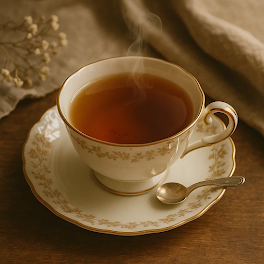7 Science-Backed Reasons to Sip Tea on International Tea Day
Priyanka Kumari, Chandan Gautam
5/27/20252 min read


Tea is more than a cultural staple—it’s a scientifically proven wellness drink. On this International Tea Day (May 21), let’s explore how each sip supports your health, backed by credible research and global health data.
🍵 Types of Tea at a Glance
Green Tea – Unoxidized, rich in antioxidants like EGCG
Black Tea – Fully oxidized, robust flavor, heart-healthy
White Tea – Least processed, delicate, high in catechins
Oolong Tea – Semi-oxidized, balance of green and black properties
Herbal Teas – Caffeine-free infusions (e.g., chamomile, tulsi)
Matcha – Powdered green tea, nutrient-dense
Flavored/Functional Teas – Blends with spices, flowers, or adaptogens
☕ 1. Enhances Brain Function
Best Tea: Green Tea
According to a study published in The American Journal of Clinical Nutrition in 2010, tea’s combination of L-theanine and caffeine improves attention and alertness. Regular tea consumption is also linked to reduced risk of cognitive decline and dementia.
Preparation:
Green Tea: Steep 1 tsp in 80°C water for 2–3 minutes. Don’t use boiling water—it kills antioxidants.
Matcha: Whisk 1/2 tsp matcha in hot (not boiling) water until frothy.
❤️ 2. Promotes Heart Health
Best Tea: Black Tea
The European Journal of Preventive Cardiology in 2020 reports that habitual tea drinkers have a lower risk of atherosclerotic cardiovascular disease. Tea flavonoids help reduce LDL cholesterol and improve vascular function.
Preparation:
Steep 1 tsp black tea leaves in 95°C water for 3–5 minutes.
Add milk/lemon optionally, but skip sugar for max benefits.
🌿 3. Supports Gut Microbiota
Best Tea: Oolong Tea
Research in Food Research International in 2021 shows that polyphenols in tea act as prebiotics, feeding good gut bacteria and aiding digestion. This balance contributes to better immunity and reduced inflammation.
Preparation:
Use 1 tsp oolong leaves per cup. Steep in 90°C water for 3–4 minutes.
Re-steep up to 3 times for full benefit.
⚖️ 4. Helps with Weight Management
Best Tea: Green Tea
According to the Journal of the American College of Nutrition in 2016, epigallocatechin gallate (EGCG) in green tea enhances fat burning and thermogenesis, assisting in weight regulation—especially when paired with healthy lifestyle choices.
Preparation:
Green Tea: 2–3 cups a day; avoid empty stomach.
Matcha: Try it as a latte with plant-based milk for added taste.
🔬 5. Rich in Antioxidants
Best Tea: White Tea
In a study done by Minich DM, Brown BI. A Review of Dietary (Phyto)Nutrients for Glutathione Support in 2019 states that tea is packed with antioxidants like catechins and theaflavins, which combat oxidative stress. This helps prevent cell damage and lowers the risk of chronic diseases including cancer and diabetes.
Preparation:
Steep 1 tsp white tea in 75–80°C water for 3–4 minutes.
Keep it light to preserve delicate flavors.
😌 6. Reduces Stress and Promotes Calm
Best Tea: Chamomile or Tulsi Tea
A study published in Nutrients in 2019 shows that L-theanine in tea can lower cortisol levels, reduce stress, and improve mood. Herbal teas like chamomile and tulsi are particularly calming and often used in stress management therapies.
Preparation:
Chamomile: Steep 1 tbsp dried flowers in hot water (95°C) for 5–6 minutes.
Tulsi: Use fresh leaves or tea bags; steep for 5–7 minutes.
🌍 7. Culturally and Environmentally Sustainable
Best Tea: Organic Herbal Teas (locally sourced)
Tea is not only good for the body—it’s good for the planet. Sourced sustainably, tea requires less water and energy than many beverages. The Food and Agriculture Organization (FAO) in 2023 recognizes tea as a key crop for sustainable agriculture and global employment.
Preparation:
Steep 1 tsp dried herb in boiling water for 5–7 minutes.
Cover while steeping to retain volatile oils.
✨ The Takeaway
On this International Tea Day, sip with science. Whether for clarity, calm, or cardiovascular health, tea offers proven benefits for body and mind.
